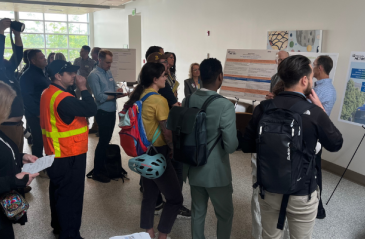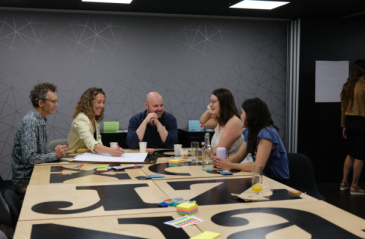
The information barriers holding back climate action and how to break them

the UK govt delivered the biggest cost-cutting programme that the world has ever been
Share articleTiming is everything, says Maude: "Just get on and do things"
Share articleTransparency was an idea whose time had come, says Maude
Share articleWe put our vision for government into practice through learning partner projects that align with our values and help reimagine government so that it works for everyone.
You could argue that Francis Maude saved the best for last. After a 30-year career in politics that saw him experience the usual ups and downs of public life, his final five years as architect and overlord of the UK government's sweeping digital reform and transformation programme saving billions and renewing public services in the process is clearly something that continues to give him much satisfaction.
"Our digital reforms were incredibly important and in a way were the most glamorous part of it they were fun and genuinely world leading but I am also very proud that we saved so much money," he reflects. "Someone thoughtfully said to me the other day that 'it had got to be the biggest cost-cutting programme that the world has ever seen', which had honestly never occurred to me. I have no idea whether it is or not, but it is certainly pretty serious. And we managed to do it in a way that didn't damage services if anything we made services better."
It's fair to say that the reforms, which took place after the election of a coalition government in May 2010, did not lack for ambition. The financial crisis had hit the previous UK government particularly hard, draining budgets and leading to higher spending and economic recession "we had the biggest budget deficit in the developed world, making Greece look like beginners," recalls Maude and there was a clear and pressing need to take action, and take action quickly.
He says that he and his ministerial colleagues were faced with three options. "When you're facing the prospect of fiscal tightening, you have three tools at your disposal: you can raise taxes; you can cut programmes and services; or you can cut your costs. Well, I can't say we didn't raise taxes we did and I can't say we didn't cut some services and programmes we did but we decided the main burden of what we did would be to cut the overhead costs of government. This is difficult to do, but we decided that this was where the main burden should fall."
So, where to start? Maude admits that they didn"t lack for options, but he says that the reforms which encompassed waste and headcount reductions, procurement changes and much else besides were based on five key themes: open, tight, loose, culture and digital.
"The first, 'open', was based on open data and transparency, which were hugely important," he says. "We had decided that we would be a leader in releasing datasets to the public for others to use. Nothing is more powerful than an idea whose time has come, and transparency is patently an idea whose time has come. By the end of five years we were being ranked by three international bodies as top in the world for open government."
He goes on to say that ‘tight" involved tight control of common areas of spend, such as shared services, real estate and oversight of major projects. "We introduced very tight controls over those to control costs and get a grip and visibility over what was going on," he explains. "The third theme was 'loose', and this was encouraging spinouts and innovation," he explains. "We were trying to release the central grip over how frontline services were designed and delivered, because the people who know best how to deliver frontline services are surprisingly enough people on the frontline."
His passion for this particular reform comes through loud and clear. "To start with, I didn"t understand and neither did many of my Conservative colleagues that an employee-owned, not-for-profit social enterprise nonetheless massively incentivised people to up their performance," he admits. "But this sense of ownership was an incredibly powerful contributor to the delivery of citizen-centric services. I have no doubt that models in this very broad area are going to be the way of the future."
The fourth theme 'culture' was about developing a culture where innovation was encouraged. "This is probably the area where we were least successful," he concedes. "We did cut the size of the civil service by over 20% and reformed public sector pensions, but cultural change is incredibly difficult to achieve and I won't claim more than partial success there."
However, the fifth theme, 'digital', was a whole other story. Despite the best intentions and efforts of their predecessors, the new government in 2010 inherited what Maude describes as "the worst IT programmes in the world the most expensive and falling in the rankings". So, they decided to do something very different.
"One of the first things I did was invite Martha Lane Fox, one of the heroines of the dotcom boom, to do a very quick report on how we make Britain the most digital government in the world. The two glaring conclusions she reached were first, our doctrine should be 'digital by default'. If a public service can be delivered digitally and delivered online, then it should be delivered only online. And her second was to appoint as government's chief executive of digital the best person you can possibly find, and she recommended Mike Bracken, who stepped down last year after five years" sterling service leading what is now widely seen as the gold standard for government digital transformation."
Such was the UK's success that other countries have sought to emulate its approach. The US, for example, has established the US Digital Service, explicitly modelled on the UK version. Australia, too, has followed in the UK's wake. "In the early part of last year, 2015, I suddenly got an email from Malcolm Turnbull, who was not prime minister but minister for communications," recalls Maude. "It simply said 'Francis, if plagiarism is the sincerest form of flattery you should be feeling very flattered', because they were setting up their own digital transformation office, indeed plucking someone out of GDS to set it up and run it."
A common thread running through Maude's approach to governing is his sense of impatience. Not for him the delays of consultation and labyrinthine legislative amendments far better, he believes, just to get on with it.
"A different way of doing things is to try it, iterate it, don't spend a lot of time working out what the strategy or theory is just get on and do things, see what works and build on what works," he says. "Great organisations learn more from the things that are tried that don't work than they do from the things that are tried and do work. If you're not trying new things then you're not progressing you're just going backwards, which has been the story of government for a long time."
Over the course of five years, the reforms delivered a cumulative total of more than £50 billion of savings, audited and attested. Maude traces much of the credit for this success to the fact that he remained in post for the full five-year parliamentary term a rarity, given that most ministers move on to a different brief after a couple of years.
"This continuity was an unbelievably important part of it," he says. "Ministers normally get moved on just as they get on top of it, and senior civil servants made several attempts to move me on, up, sideways or out they were ruthless but ineffective. They couldn"t understand that a senior politician just wanted to do this and nothing else."
However, it wasn"t all plain sailing. He admits that the current dearth of top women civil servants in Whitehall is a frustration especially given that the diversity was better a few years ago than it is today. "Not long ago there were many women permanent secretaries some did brilliantly and some didn"t which, I think, is partly an indication that we prepare people very poorly for very senior roles. The civil service just doesn"t take preparing its senior leaders seriously enough."
He goes on to bemoan the old-school attitudes that continue to permeate thinking and the approaches that continue to hinder more women from making it to the top tier. "We did a study on this and the killer quote was from a talented woman official who had applied for a director-general role. She was told that the reason she hadn"t been interviewed was that she would have outperformed the man whose turn it was. Too much is about time served rather than rigorous selection of people with the most potential and talent, and then investing in them."
Similarly, a question about whether civil servants possess the necessary skill-sets in an era of data analytics and complex procurement contracts to take two examples prompts the quick answer: "noâ€. He adds: "I once had a group of young people from the fast stream in for a lunch. One said she had applied to do a day course in Excel and some of the others asked why she was bothering. I was genuinely shocked that they thought that learning how to use a spreadsheet wasn"t something they should be doing."
For Maude, or rather "The Rt Hon Lord Maude of Horsham" he entered the House of Lords last year after stepping down as an MP such examples explain why he believes that public sector reform will always be a work-in-progress.
"Governments are not set up to be able to change at the same pace and we know that all big established institutions are prone to inertia," he concludes. "The state is the worst of all in this regard, but it doesn"t need to be. What we were doing was unleashing, irreversibly, the way in which governments are going to have to operate in the future but there is always more to do."











